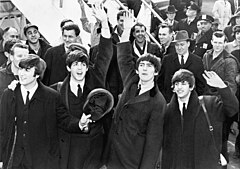
Back Beatlemánie Czech Beatlemania Danish Beatlemania German Μπιτλομανία Greek Beatle-manio Esperanto Beatlemanía Spanish Beatlemania Finnish Beatlemania French Beatlemanía Galician ביטלמניה HE

| History of the Beatles |
|---|
 |
Beatlemania was the fanaticism surrounding the English rock band the Beatles from 1963 to 1966. The group's popularity grew in the United Kingdom in late 1963, propelled by the singles "Please Please Me", "From Me to You" and "She Loves You". By October, the British press adopted the term "Beatlemania" to describe the scenes of adulation that attended the band's concert performances. By 22 February 1964, the Beatles held both the number one and number two spots on the Billboard Hot 100, with "I Want to Hold Your Hand" and "She Loves You", respectively. Their world tours were characterised by the same levels of hysteria and high-pitched screaming by female fans, both at concerts and during the group's travels between venues. Commentators likened the intensity of this adulation to a religious fervour and to a female masturbation fantasy. Among the displays of deity-like worship, fans would approach the band in the belief that they possessed supernatural healing powers.
In February 1964, the Beatles arrived in the United States and their televised performances on The Ed Sullivan Show were viewed by approximately 73 million people. There, the band's instant popularity established their international stature, and their unprecedented domination of the national sales charts was mirrored in numerous other countries. Their August 1965 concert at New York's Shea Stadium marked the first time that a large outdoor stadium was used for such a purpose, and with an audience of 55,000, set records for attendance and revenue generation. To protect them from their fans, the Beatles typically travelled to these concerts by armoured car. From the end of that year, the band embraced promo clips for their singles to avoid the difficulties of making personal appearances on television programmes. Their December 1965 album Rubber Soul marked a profound change in the dynamic between fans and artists, as many Beatles fans sought to appreciate the progressive quality in the band's look, lyrics and sound.
In 1966, John Lennon controversially remarked that the group had become "more popular than Jesus". Soon afterwards, when the Beatles toured Japan, the Philippines and the US, they were entangled in mob revolt, violence, political backlash and threats of assassination. Frustrated by the restrictions of Beatlemania and unable to hear themselves play above their fans' screams, the group stopped touring and became a studio-only band. Their popularity and influence expanded in various social and political arenas, while Beatlemania continued on a reduced scale from then and into the members' solo careers.
Beatlemania surpassed any previous examples of fan worship in its intensity and scope. Initially, the fans were predominantly young adolescent females, sometimes called "teenyboppers", and their behaviour was scorned by many commentators. By 1965, their fanbase included listeners who traditionally shunned youth-driven pop culture, which helped bridge divisions between folk and rock enthusiasts. During the 1960s, Beatlemania was the subject of analysis by psychologists and sociologists; a 1997 study recognised the phenomenon as an early demonstration of proto-feminist girl power[citation needed]. The receptions of subsequent pop acts – particularly boy bands and Taylor Swift – have drawn comparisons to Beatlemania.